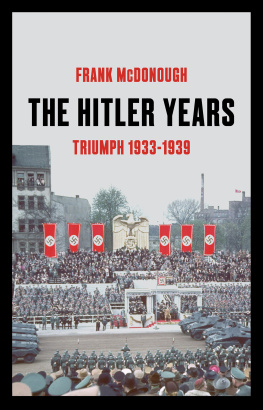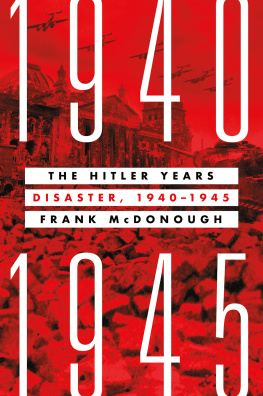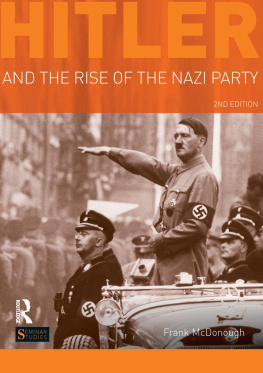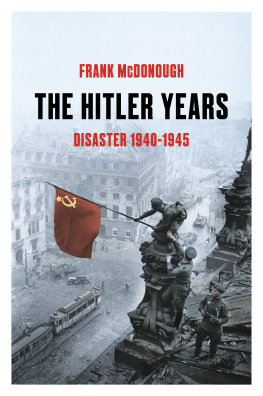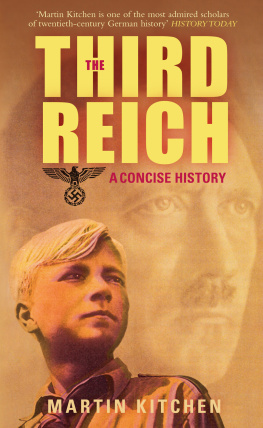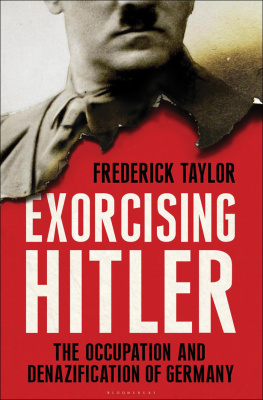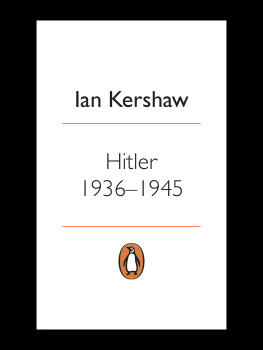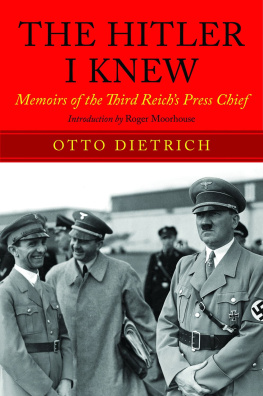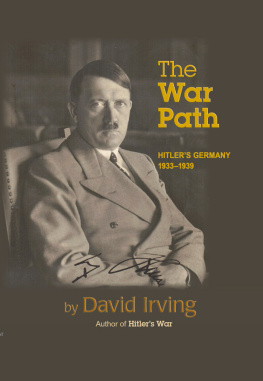THE
HITLER
YEARS

Getty images
THE
HITLER
YEARS
VOLUME 1
TRIUMPH
19331939
FRANK M C DONOUGH
AN APOLLO BOOK
www.headofzeus.com
In loving memory of:
Brother Michael McDonough (19512018)
Sister Carol Ann McDonough (19532017)
For Ann with love
This is an Apollo book, first published in 2019 by Head of Zeus Ltd
Copyright Frank McDonough 2019
The moral right of Frank McDonough to be identied as the author of this work has been asserted in accordance with the Copyright, Designs and Patents Act of 1988.
All rights reserved. No part of this publication may be reproduced, stored in a retrieval system, or transmitted in any form or by any means, electronic, mechanical, photocopying, recording, or otherwise, without the prior permission of both the copyright owner and the above publisher of this book.
A catalogue record for this book is available from the British Library.
ISBN ( HB ) 9781784975920
( E ) 9781784975913
Picture research Juliet Brightmore
Images: Getty and Shutterstock
Head of Zeus Ltd
58 Hardwick Street
London EC R RG
WWW . HEADOFZEUS . COM
CONTENTS
1933
DEMOCRACY AND COMMUNISM DESTROYED
1934
BLOOD PURGE
1935
BREAKING FREE OF VERSAILLES
1936
OLYMPIAN HEIGHTS
1937
DECEPTIVE CALM
1938
HIGH ANXIETY
1939
HITLER S RACIAL WAR

Territory lost by Germany in the Treaty of Versailles
Getty images

German Expansion from 19331939
Getty images

German and Soviet invasion of Poland, September 1939
Getty images
The Third Reich was dominated by Adolf Hitler, who boasted that it would last for a thousand years. It ended catastrophically twelve years and four months later. Hitlers destruction of democracy in Germany, his attempt to dominate the world by force, and the horrific Holocaust he ordered are central events in history. Up to the end of 1941 Hitlers armies conquered larger areas of territory than Julius Caesar, Attila the Hun and Napoleon. The ghost of Hitler is ever present in political discussions, in modern culture, in the media and throughout historical debate. Hitler remains the epitome of horror, but also a source of endless fascination.
The Hitler Years aims to tell the story of the history of the Third Reich from 1933 to 1945 in two volumes. I adopt a chronological explanation. Each chapter deals with a particular year to give a blow-by-blow account. Sections in each of the chapters explore various themes to provide further context to the events under discussion. This allows the reader to see how events evolved and fitted into the overall development of Hitlers rule.
Narrative history incorporating analysis and interpretation is, in my view, preferable to a thematic structure, which might be suitable for students looking at various aspects on a university module, but can become extremely difficult to follow for the general reader. So many new books appear each year on various aspects of the history of the Third Reich but there are few general histories and a new one is thoroughly warranted.
This first volume, Triumph , covers the period 1933 to 1939. It begins with the dramatic intrigues that brought Hitler to power, and ends shortly after his swift conquest of Poland in 1939. The second volume, Disaster , starts with the build-up to the attack on Western Europe in 1940, then moves on to examine the key battles of the Second World War and the Holocaust and concludes with the catastrophic German defeat in 1945. Each volume can be read as a distinct examination of each period but taken together they make up a comprehensive history of the period Hitler ruled Germany between 1933 and 1945.
These two volumes draw on a wide range of sources, including letters, speeches, newspapers, government documents, party records, army memoranda, SS and Foreign Ministry documents, war-trial evidence, interviews with contemporary witnesses, diaries and memoirs. Some sources give the view from the top, others the reaction of ordinary people from below. The way these different viewpoints interact gives us a rich and vivid picture of events as they unfold. These books would have been impossible to write without drawing on the major achievements of recent political, diplomatic, economic, social and military historians.
The monumental events related in the following pages are not, in my view, susceptible to any simple thesis. However, my interpretation of each episode, which grows out of the sources assembled, makes clear my position at every stage and new insights emerge repeatedly. These two books will correct many of the myths that have developed over many decades concerning Hitlers foreign and racial policies and life inside the Third Reich.
There are hundreds of thousands of historical studies of Hitlers Germany. Old disagreements among academic historians between the intentionalists, who believe Hitler was an all-powerful master of the Third Reich, and the structuralists, who view him as a weak dictator presiding over a chaotic political system now seem inconclusive. It is possible to argue in favour of either case in different policy areas.
There were some historians who argued that Germany followed a Sonderweg or special path of abnormal development over centuries that rejected democracy and modernity in favour of a militaristic and aristocratic will to create a European empire. This made German militarism and its association with Hitler seem wholly inevitable. However, this idea that Germanys politics and economy developed differently from other major European nations is now viewed as flawed and too deterministic.
The same is true of writers who depicted the Third Reich as a totalitarian dictatorship. One of the prime examples was Hannah Arendt in The Origins of Totalitarianism (1951) which suggested that Hitlers regime was very similar to Joseph Stalins Soviet Union. In practice, however, Nazi government was much less totalitarian than the USSR. The German public had far greater latitude to grumble and criticize than was previously supposed. The original concept of totalitarianism now seems a deeply flawed way to explain Hitlers rule.
Even if Hitler had never come to power Germany would probably have had a right-wing nationalist coalition during this period. Conservative power brokers in German politics had never accepted Germanys defeat in the Great War and they had utter contempt for democracy. A right-wing nationalistic regime, supported by the army, would have almost certainly attempted to revise the Treaty of Versailles, which was regarded by most Germans as a gross injustice, and they may even have done so with the blessing of the British and the French governments. However, without Hitler as leader, it is extremely doubtful that such a conservative-nationalist regime would have resorted to mass genocide founded upon racist and anti-Semitic ideas.
Hitler and his radical National Socialism was therefore central to what happened in Germany from 1933 to 1945. It is impossible to believe that German or indeed world history would have taken the same course had Adolf Hitler never lived. Yet Hitler did not create the very specific circumstances that persuaded him to pursue a career in politics and which crowned him leader. Without the Great War and Germanys strong sense of humiliation, the Nazi Party would not have needed to exist.

